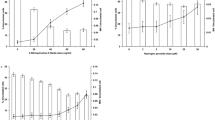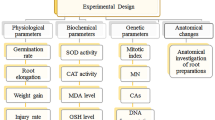Abstract
THE effects of various metals on living cells in tissue culture are being investigated in this Laboratory, and a non-lethal disturbance of normal mitosis produced in chick fibroblasts by cobalt (as chloride) has already been reported1. This effect, which is characterized by the persistence of the nucleoli in mitotic cells throughout prophase into meta-, ana- and telo-phase, appears to be specific for cobalt, inasmuch as no comparable effect is produced by nickel, iron, zinc, chromium, manganese or beryllium in sublethal concentrations.
This is a preview of subscription content, access via your institution
Access options
Subscribe to this journal
Receive 51 print issues and online access
$199.00 per year
only $3.90 per issue
Buy this article
- Purchase on Springer Link
- Instant access to full article PDF
Prices may be subject to local taxes which are calculated during checkout
Similar content being viewed by others
References
Heath, J. C., Exp. Cell Res. (in the press).
Hueper, W. C., Texas Rep. on Biol. and Med., 10, 167 (1952).
Author information
Authors and Affiliations
Rights and permissions
About this article
Cite this article
HEATH, J. Cobalt as a Carcinogen. Nature 173, 822–823 (1954). https://doi.org/10.1038/173822a0
Issue Date:
DOI: https://doi.org/10.1038/173822a0
This article is cited by
-
Tissue compatibility of different intracranial implant materials: In-vivo and in-vitro studies
Acta Neurochirurgica (1984)
-
Cadmium as a Carcinogen
Nature (1962)
-
Die experimentelle Erzeugung von Sarkomen bei Ratten und M�usen durch Implantation von Rundscheiben aus Gold, Silber, Platin oder Elfenbein
Die Naturwissenschaften (1955)
Comments
By submitting a comment you agree to abide by our Terms and Community Guidelines. If you find something abusive or that does not comply with our terms or guidelines please flag it as inappropriate.



